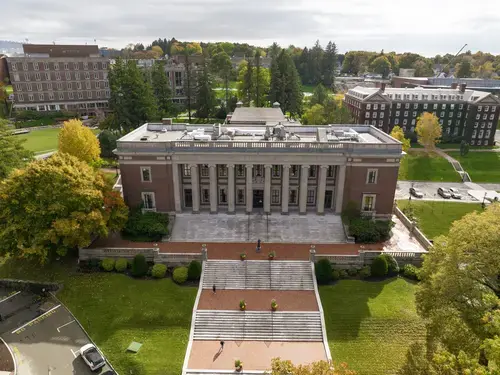
Pre-Law

Areas of Study
The Prelaw Program offers individual advising for both students and alumni who are interested in attending law school. The program also offers a variety of resources, such as:
- A wide range of speakers who visit campus to speak about careers and the law school experience. A visiting law professor also conducts a class to expose students to a typical law school class and answer questions.
- Opportunity to attend the annual Law Forum in Boston, with the chance to meet more than 100 law school admissions representatives.
- Interviews on campus with approximately a dozen law schools that visit Holy Cross annually.
- LSAT materials and our own comprehensive LSAT preparation program.
- Advising and law school preparation services.
Requirements
These skills that are necessary for success in law school align particularly well with those that we seek to develop in all students who attend Holy Cross. In fact, they are the hallmark of our liberal arts education.
Academic Preparation
Choosing a Major
Many of our students choose to major in English, history, economics or political science, but we have had students from all of our majors gain admission to law school. There is no defined pre-law curriculum.
The law school admissions process is competitive, in particular at upper-tiered schools. What ultimately counts to law school admission committees is how well you have performed in your chosen field of study. Choose a major that you find interesting, exciting and challenging, and where you have the ability to do your best work.
Choosing Courses
The best courses to take at Holy Cross are those that will enable you to complete your total undergraduate educational needs as well as provide a solid foundation for law school. We recommend you choose courses that improve your thought and reasoning process, sharpen your communication and presentation skills, hone your research skills and develop your understanding of the human experience and the evolution of our institutions.
Application Resources
The Law School Admission Test (LSAT) is currently offered eight times each year: January, February, April, June, August, September, October and November. The LSAT exam score and academic record (GPA) earned by each applicant are the main criteria for law school admission and for that reason, should not be taken lightly.
Applicants should be adequately prepared for the exam. Plan to prepare and take the LSAT and re-take the exam because law schools take an applicant's higher/highest score. Prep courses are expensive; however, they appear more reasonable when you spread these costs over your lifetime earnings as an attorney.
If you can earn 5-8 more points on the LSAT it may have a huge effect on the law school you will be accepted to. The school you attend will likely have a big effect on your starting salary upon graduation. The Holy Cross LSAT prep course is offered each semester, and we are considerably less expensive than private preparation companies. Students who receive financial aid at Holy Cross could be eligible for tuition reduction for the course.
You can register for the LSAT at the Law Services Admissions Council.
You can register for LSDAS at the same time if you wish. LSDAS is short for the Law School Data Assembly Service, a service provided to the law schools by LSAC. Essentially, you forward an official copy of your transcript from the Holy Cross Registrar’s Office to LSDAS, where it is analyzed and evaluated. Your GPA is then recomputed with rules that make transcripts and GPA calculations consistent from school to school (quarters/trimesters/semesters: different value scales are brought in line with 4.0, etc.)
They typically count all course work in the Law School Credential Assembly Service GPA except four types; they exclude physical education grades, ROTC grades, performance art courses (pottery, oil painting) and performance music (choir, learning to play the guitar). All other courses count in the LSDAS GPA. Note that although Holy Cross may not include study abroad or summer school grades in your grade point average, LSDAS does.
We offer materials to assist students with the LSAT. We have a contract with one of the leading LSAT test preparation services where they provide our students an on-campus course with a material price discount and financial aid to students receiving aid from the college. As a result, we believe more of our students are prepared for taking this difficult exam.
National Test Preparation Programs
The Center for Career Development arranges info sessions for our students with about a dozen law schools that visit Holy Cross annually. Both the center and the Prelaw advisor maintain files and other resources (literature, catalogs, etc.) and information of general interest to prelaw students. A credential file is available that allows for the gathering of letters of recommendation for either immediate or later (post-graduation) use in applying to law school.
Law schools typically require the following admissions application materials:
- LSAT Score
- Grades/Undergraduate transcripts
- Personal Statement
- Letters of Recommendation
More so than in other professions, the reputation of the law school you attend will have a material effect on your employment opportunities when you graduate. There is great demand for graduates at the most highly regarded law schools. That demand tapers off, in terms of median starting salaries and number of offers received by graduates, as a school's rank declines.
Top law schools tend to offer outstanding physical facilities, extensive library resources, gifted classmates and professors and employment contacts with recruiters who have strong and often long-standing contacts with the school. Without question, professional employment opportunities and career paths are the broadest at the better schools.
That said, recognize that all of the rankings are imperfect. Formulas and weights are tinkered with periodically by the ranking organization, which may cause changes in the rankings even though the school itself has not changed. Use the rankings as a guide in how schools are perceived by judges, lawyers and the deans of other law schools. Also recognize that the rankings are not necessarily an indicator of the quality of the legal education you will receive. It is important to recognize that you can get a solid legal education at most ABA accredited law schools.
Overall scores calculated by weighing academic reputation (40%), admission selectivity (25%), employment rates after graduation (20%) and faculty resources (15%).
This remarkable site, part of the Internet Legal Resource Guide, provides rankings in dozens of categories including starting salaries, placement rates, cost-benefit analysis comparing tuition costs with employment earnings, student services and a composite ranking of all the rankings.
Princeton Review ranks the schools based on information they gather from students and other sources.
Here are some facts you might consider about applying to the Jesuit law schools:
- One out of every 10 American law students is enrolled in a Jesuit law school. In the U.S. alone, there are 27 Jesuit colleges and universities located from coast to coast. Of these, 14 have a law school.
- Located primarily in large cities, Jesuit law schools were among the first to provide access to women and people of color, and to offer both day and evening programs of study.
- Programs of study share a distinct Jesuit heritage, one which values the pursuit of academic excellence, acquisition of knowledge for the betterment of society, care and concern of the individual and preparation for public service.
Jesuit Law Schools in the U.S.
- Boston College Law School
- Creighton University School of Law
- University of Detroit Mercy School of Law
- Fordham University
- Georgetown University Law Center
- Gonzaga University School Of Law
- Loyola Law School, Los Angeles
- Loyola University of Chicago School of Law
- Loyola University of New Orleans School of Law
- Marquette University Law School
- Saint Louis University School of Law
- University of San Francisco School of Law
- Santa Clara University School of Law
- Seattle University School of Law
It is not necessary to attend law school immediately after graduating from Holy Cross. As higher-education costs continue to increase, more and more students apply to law school within one to three years of graduating from their undergraduate college. Students defer for many reasons (they want to work for a while, they are not sure law school is right for them yet, financing a graduate degree is a problem, they have a commitment to ROTC, volunteer work, etc.). Students pursuing a degree in law quickly discover that most aid at the professional school level (physicians, lawyers, etc.) comes in the form of loans. You will have to search for scholarships.
As part of your search, be sure to directly contact the law schools you’re applying to regarding available grants and scholarships that each particular school is offering. As competition for law students has increased, many law schools have programs designed to increase the quality of their incoming students by offering financial incentives. Do not be bashful about inquiring about aid once you have applied.
There are a range of ways to finance your legal education, but most students will find Federal Stafford Loans an efficient and reliable way to obtain funding. The sites identified below should be helpful in efficiently locating financing options. If you are just starting your search, consider starting with the Law Access, Inc., a part of the Access Group. Law Access is part of a non-profit organizational service dedicated solely to educational lending. Their site provides updated summaries of interest charges, government subsidies and payback options available.
-
Access Group
This non-profit organization coordinates the majority of loans used to pay for a legal education. They offer competitive rates, low or no guarantee fees on government Stafford Loans, Bar Exam loans, consolidation loans and private loans. -
College Board Online
Comprehensive list of financing sources, including access to a database that has 2,200 scholarships that total nearly $6 billion. -
eStudent Loan
When law school grants and government loans are not going to cover your costs, this site has a “Loan Finder” that will compare loan programs from a range of private lenders. -
Fastweb
Free internet search service advertising the ability to match 1.5 million available scholarships to students meeting a wide range of criteria. -
FinAid
Includes comprehensive and updated sources of various forms of financial aid, “special interest” aid and scholarships. Students may also find the education cost projectors and student loan calculators useful features. -
Petersons Education Center
Comprehensive list of financing sources, including access to a database that has over $10 billion available in scholarship awards. -
U.S. Department of Education
With nearly 70% of student aid supplied by the federal government, this is a valuable site to search for low interest loans, work-study and grant programs. You can also complete the “Free Application for Federal Student Aid” (FAFSA) online.
Helpful Links for Legal Research
Starting points for a law research project.
Opportunities
Annual Law Forum
Students are invited (and we provide a bus) to attend the annual Law Forum in Boston, where more than 100 law school admission representatives are present to meet prospective law students and distribute their promotional and other admission materials.
Speakers
The Prelaw Advisor organizes a wide range of speakers, usually alumni, who return to Holy Cross to speak to our students about their careers and law school experience. We also have a law professor visit the College to conduct a law class at Holy Cross, and answer questions generated by the students who attend.
Holy Cross Prelaw Society
The Holy Cross Prelaw Society is an organization of students considering law as a career. The society suggests and presents several events a year, often including film and discussion sessions.
Trial Teams
Through participation in our award-winning moot court, mock trial and mediation teams, students have the ability to put their critical thinking and oral communication skills into action, gaining valuable “practice” experience in analyzing cases, presenting arguments and examining witnesses.
Participation in Moot Court and Mock Trial is not limited to students interested in law school; successful team members represent a wide variety of majors and interests, and the skills that are developed through this experience are valuable for today’s professionals in any career.
Outcomes
Several of our graduates who participate in the Pre-Law program go onto law school and succesful law careers.
- 60-70 Holy Cross graduates enter law schools accredited by the American Bar Association
- 90% acceptance rate
- 30-40 Holy Cross graduates matriculate from law schools in a typical year
Anthony B. Cashman, III, Ph.D.
P.O. Box 225A








